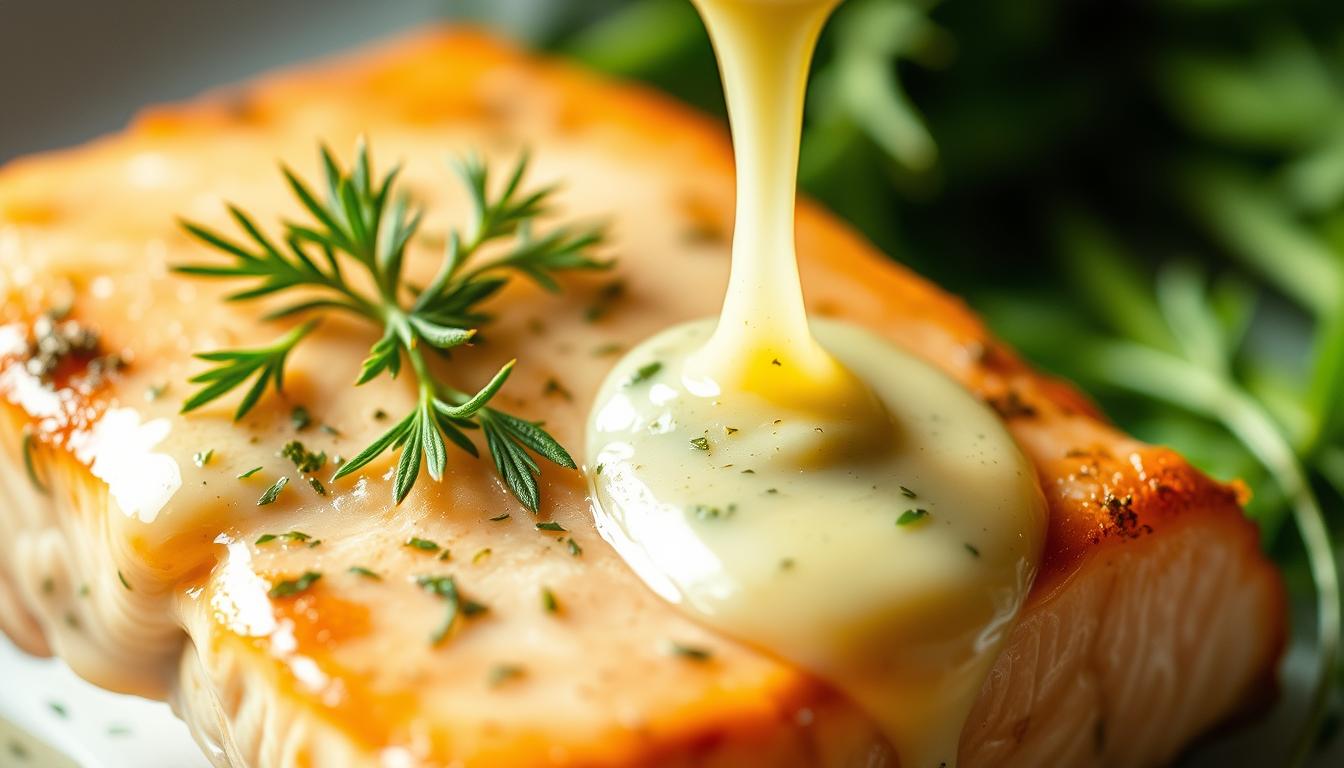Make your dishes better with a tangy lemon dill sauce for salmon. It’s simple to prepare and brings a refreshing burst of citrus and herbal flavors. It’s great with grilled or baked salmon.
Creating this easy salmon sauce at home is simple. Just mix lemon juice, dill, and spices. It makes a flavor mix that goes well with salmon.
Key Takeaways
- Learn how to make a delicious lemon dill sauce
- Discover the perfect accompaniment for grilled or baked salmon
- Understand the importance of using fresh ingredients
- Discover tips for personalizing the sauce to suit your preferences
- Find out how to store the sauce for later use
The Perfect Lemon Dill Sauce for Salmon
Make your salmon dish better with a homemade lemon dill sauce. It’s simple to prepare and packed with flavor. This sauce is a perfect accompaniment to salmon, adding a tangy and refreshing taste. The secret to a great sauce is finding the right balance of ingredients.
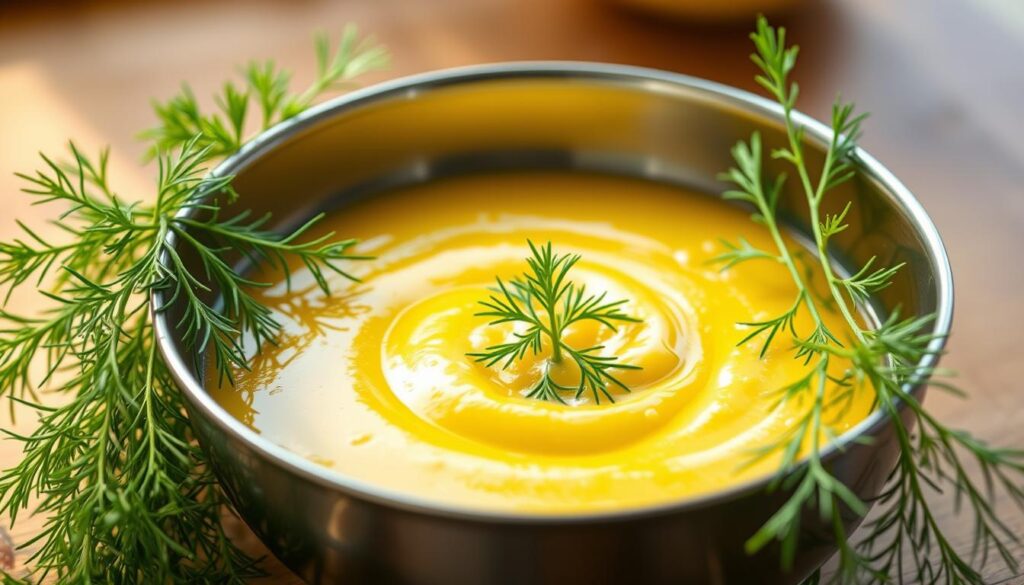
A good salmon sauce recipe mixes fresh dill with lemon juice, garlic, and a bit of mayonnaise or sour cream. This creates a sauce that’s tasty and looks good, adding color to your dish. By making your own homemade lemon dill sauce, you can tweak the flavors to match your taste, making it the perfect match for your salmon.
This salmon sauce recipe works well with different salmon cooking methods, like grilling or baking. Its bright, citrusy flavor balances out the salmon’s richness, offering a balanced taste.
Essential Ingredients for Your Sauce
The key to a great creamy dill sauce is its simple yet tasty ingredients. To whip up a tasty dill sauce for fish, you’ll need a few important items.
Base Ingredients
The base of your lemon dill sauce is key. You’ll need:
- Mayonnaise or a similar creamy base for richness and texture.
- Lemon juice for a tangy, citrusy taste.
- Sour cream or Greek yogurt for creaminess.
When combined, these ingredients create a creamy and tangy sauce.
Fresh Herbs and Aromatics
To add your sauce’s signature taste, you’ll need:
- Fresh dill, chopped finely to release its oils and flavor.
- Garlic, minced for a deep, pungent taste.
- Chopped fresh chives or parsley for extra freshness.
These fresh herbs and aromatics will boost your sauce, making it ideal for salmon.
Ingredient Substitutions
If you’re following a specific diet, you can substitute certain ingredients. For instance:
- Try a vegan mayonnaise alternative for a dairy-free option.
- Swap sour cream with a non-dairy yogurt.
These swaps let you enjoy your creamy dill sauce while meeting different dietary needs.
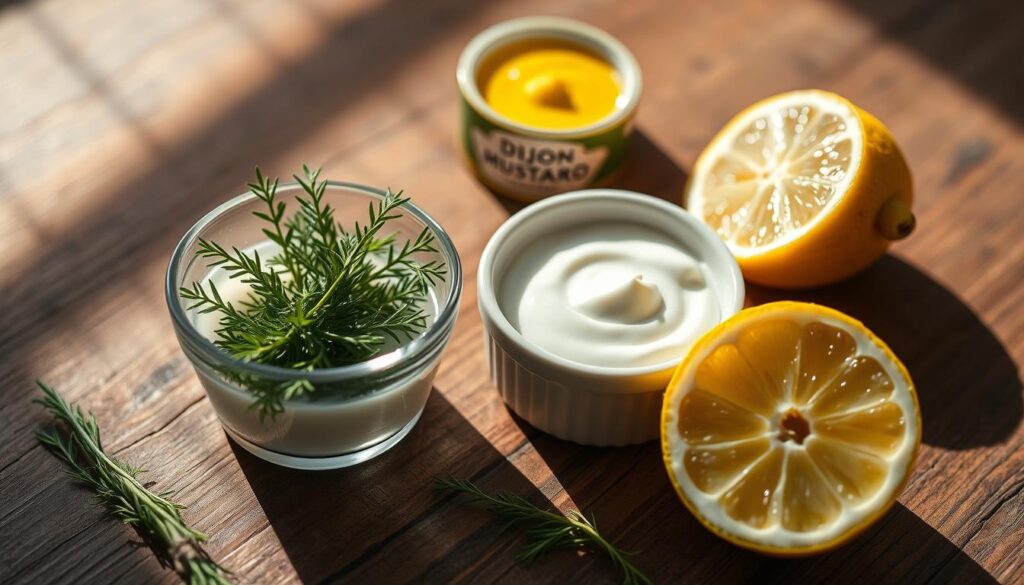
Step-by-Step Recipe Instructions
Making the perfect lemon dill sauce is easy. You just need a few simple steps. To get the best dill sauce for salmon, prepare your ingredients well, mix them together, and adjust the taste and texture as you like.
Preparing Your Ingredients
Start by finely chopping fresh dill. You’ll need about 1/4 cup. Freshness is key, so use the freshest dill you can find. Next, juice one lemon to get about 2 tablespoons of juice. Grate a small amount of garlic, about 1 clove, for depth. Having these ingredients ready makes mixing easier.
Mixing the Sauce
In a bowl, combine 1/2 cup of mayonnaise or Greek yogurt as your base. Then, add the chopped dill, lemon juice, grated garlic, and a dash of salt and pepper. Mix until everything is well combined. Sample the sauce and modify the seasoning as needed. For a lighter consistency, incorporate water or additional lemon juice.
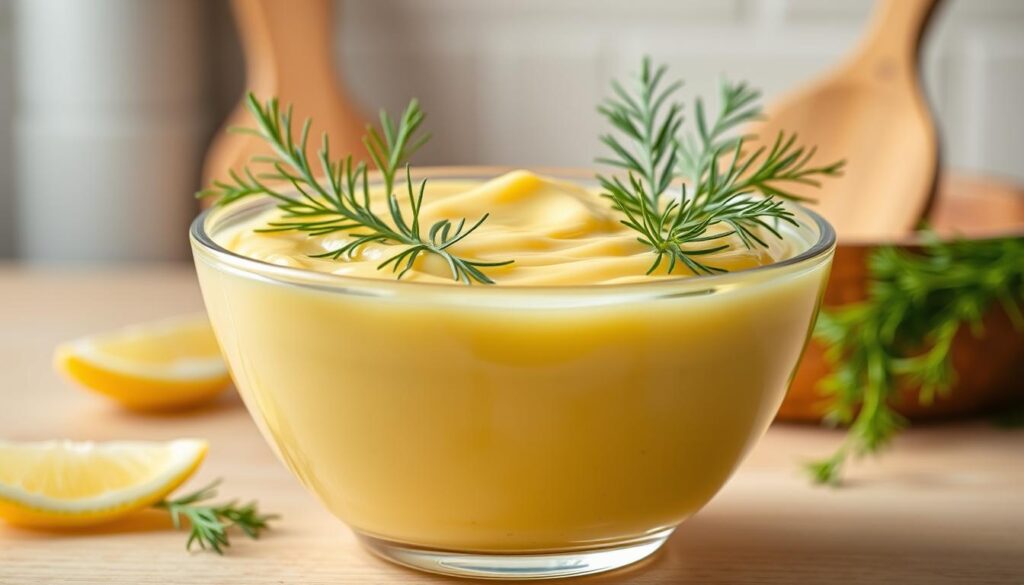
Adjusting Consistency and Flavor
If the sauce is too thick, add more lemon juice or water. If it’s too thin, add more mayonnaise or yogurt. You want it to coat your salmon well without being too runny or thick. Adjust the flavor by adding more dill, lemon, or seasoning as needed.
By following these steps, you’ll have a delicious homemade lemon dill sauce perfect for your salmon dishes.
Variations of Lemon Dill Sauce for Salmon
Try different lemon dill sauce versions to make your salmon dishes even better. A few tweaks can bring out various flavors, pleasing different tastes and dietary needs.
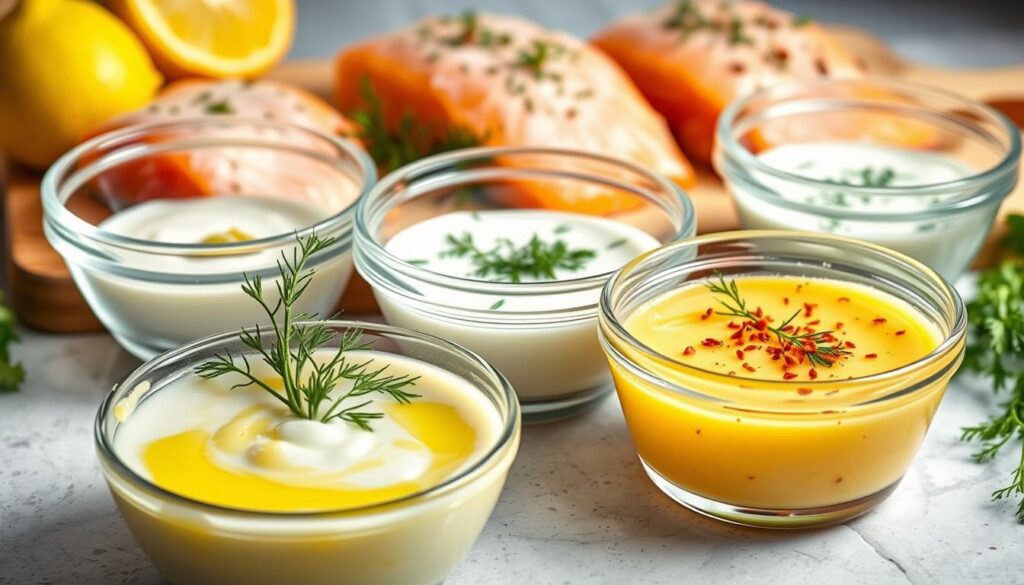
Creamy Version
For a richer taste, add sour cream or mayonnaise to the basic recipe. This makes the sauce thicker and more indulgent. It’s great for those who love a tangy, creamy sauce with their salmon.
Yogurt-Based Alternative
Use yogurt for a lighter, healthier option. Substituting some or all of the mayonnaise or sour cream with yogurt creates a tangy lemon dill sauce. It’s refreshing and has fewer calories, perfect for summer or a healthier meal.
Dairy-Free Option
For those avoiding dairy, try a dairy-free version. Use vegan mayonnaise or coconut cream instead of traditional dairy. This way, you can enjoy a creamy sauce without dietary restrictions.
These variations let you explore and find the ideal lemon dill sauce for your salmon. Whether you prefer creamy, tangy, or dairy-free, there’s something for everyone.
Best Ways to Serve with Different Salmon Preparations
Choosing the right way to serve your salmon with lemon dill sauce can really boost your dish. This sauce goes well with grilled, baked, or poached salmon. It’s very versatile.
Pairing with Grilled Salmon
Grilled salmon and lemon dill sauce complement each other perfectly. The smoky flavor from the grill pairs well with the sauce’s bright citrus taste. You can brush the sauce on the salmon during the last few minutes of grilling. Or, serve it on the side for dipping.
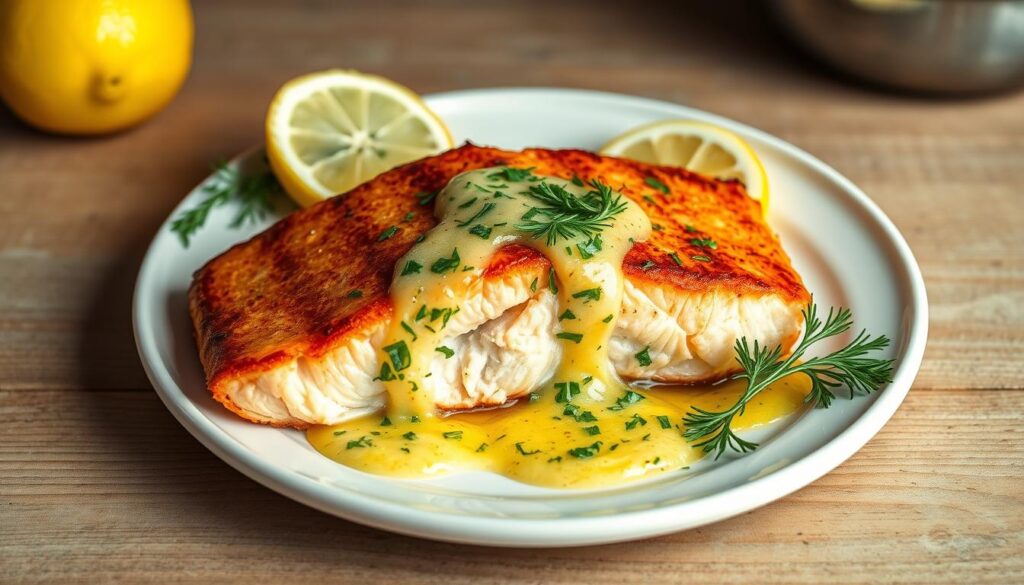
Complementing Baked Salmon
Baked salmon is a great base for the lemon dill sauce’s flavors. You can drizzle the sauce over the salmon before baking for a deeper flavor. Or, serve it on top after baking for a fresher taste. The sauce enhances the dish with moisture and flavor.
Enhancing Poached Salmon
Poached salmon is tender and can be elevated further with s dill sauce. Serving the sauce on the side lets diners control how much they use. This keeps the salmon’s delicate flavor intact. You can also use the sauce as a poaching liquid for extra flavor.
| Salmon Preparation | Suggested Serving Method | Flavor Profile |
|---|---|---|
| Grilled Salmon | Brush sauce during last minutes of grilling | Smoky, citrusy |
| Baked Salmon | Drizzle sauce before or after baking | Moist, flavorful |
| Poached Salmon | Serve sauce on the side or use as poaching liquid | Delicate, infused |
Perfect Side Dishes to Accompany Your Salmon and Sauce
Choosing the right side dishes can make your salmon with lemon dill sauce even better. It’s all about achieving the perfect balance of flavors and textures. This ensures that the salmon’s subtle flavor remains the focus.
Here are some ideas for side dishes that complement salmon and lemon dill sauce well:
Vegetable Pairings
Roasted or steamed vegetables are great choices. Consider asparagus, Brussels sprouts, or green beans for a delightful crunch. 2. For a nutritious and delicious choice, sautéed spinach or kale are fantastic alternatives.
- Roasted asparagus with lemon zest
- Steamed broccoli with garlic
- Sautéed spinach with cherry tomatoes
Starch Accompaniments
For a starch option, quinoa, roasted potatoes, or garlic bread are ideal. They add a hearty base to your meal.
- Quinoa salad with herbs and lemon juice
- Roasted potatoes with rosemary
- Garlic bread with a hint of parsley
Tips for Perfecting Your Lemon Dill Sauce
The secret to a great homemade lemon dill sauce is in the details. To make the best dill sauce for salmon, balance flavors and get the right texture.
Balancing Flavors
It’s key to balance lemon’s tanginess with dill’s freshness. Taste as you go and tweak the seasoning. Add more lemon juice or zest for a stronger citrus taste.
Achieving the Ideal Texture
The perfect texture is smooth and creamy. If it’s too thick, simply add a little water. If too thin, simmer it to thicken.
Common Mistakes to Avoid
Avoid using old or wilted dill, as it can impart a bitter taste to the sauce. Also, avoid overmixing to prevent a thick sauce.
Health Benefits of Key Ingredients
Your lemon dill sauce is packed with nutrients. The combination of lemon and dill enhances the flavor of your salmon. It also brings health perks.
Nutritional Value of Dill and Lemon
Dill is rich in vitamins and minerals, including vitamin C and potassium. Lemon is rich in vitamin C and flavonoids, which fight off free radicals. Together, they make a tangy lemon dill sauce that’s tasty and good for you.
Why This Sauce Complements Salmon Nutritionally
The dill sauce for fish pairs wonderfully with salmon. It matches its nutritional benefits. Salmon is packed with omega-3 fatty acids, while the lemon and dill contribute vitamin C and antioxidants. This makes for a balanced and healthy meal.
Storage and Shelf Life
Proper storage of your lemon dill sauce is key to keeping its taste and texture. You have two main choices: refrigeration and freezing.
Refrigeration Guidelines
To keep your sauce fresh, store it in an airtight container in the fridge. This stops air and bacteria from getting in. The sauce can stay good for up to 5 days in the fridge. Always inspect for any signs of spoilage before using it.
- Store in an airtight container.
- Store it in the refrigerator at a consistent temperature of 40°F (4°C) or lower.
- Use within 5 days.
Freezing Options
Freezing is an excellent method to extend the shelf life of your sauce. Freezing can extend its shelf life. Transfer the sauce into a freezer-safe container or bag, making sure to leave some space for expansion. Frozen sauce can remain good for up to three months.
When you’re ready to use it, thaw the sauce in the fridge or at room temperature. Stir well before serving.
Conclusion
Now you know how to make a tasty and easy salmon sauce. Grilled salmon with lemon dill sauce makes for a perfect combination. We’ve illustrated several ways to make and relish this dish.
By using this simple yet flavorful sauce, you’ll make your salmon taste better. You’ll also get the health benefits of its ingredients. Try different ways of cooking salmon and changing the sauce to find your favorite. Lemon dill sauce will soon be a must-have in your kitchen.
FAQ
What is the most effective method for storing leftover lemon dill sauce?
Keep leftover lemon dill sauce in an airtight container in the refrigerator for up to five days. When you’re ready to use it, stir it well and adjust the seasoning if needed.
Can I make lemon dill sauce ahead of time?
Yes, making lemon dill sauce ahead of time is a good idea. Letting the flavors mix for a few hours or overnight can make it taste even better. Just keep it in the fridge.
Is lemon dill sauce suitable for other types of fish besides salmon?
Definitely, lemon dill sauce pairs well with other types of fish as well. Try it with cod, tilapia, or halibut. You might find a new favorite fish to pair with it.
How can I make a dairy-free version of lemon dill sauce?
For a dairy-free alternative, substitute non-dairy yogurt or cashew cream for sour cream or yogurt. Additionally, tweak the seasoning to achieve the perfect flavor.
What are some tips for achieving the perfect consistency for my lemon dill sauce?
To get the right consistency, play with the liquid and cream or yogurt amounts. Add more liquid if it’s too thick, or more cream if it’s too thin.
Can I freeze lemon dill sauce, and if so, how?
Yes, you can freeze lemon dill sauce. Place it in an airtight container or a freezer-safe bag. Press out air before sealing. Use it within 3 months. Thaw it in the fridge or at room temperature.
How do I prevent my lemon dill sauce from separating or becoming too watery?
To avoid separation, mix the sauce well and use yogurt or sour cream as a stabilizer. If it separates, whisk it vigorously or add more stabilizer.

